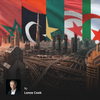Could nuclear energy one day power the Maghreb?
The Maghreb’s energy transition is a complex but critical journey towards sustainability and decarbonization as countries aim to meet

Gulf monarchies are extending their reach across North Africa, from Cairo to Nouakchott. Through foreign direct investment, trade deals and strategic diplomacy, they are quietly embedding themselves in the region’s political economy. What began as post-Arab Spring bailouts has evolved into something more sustained: a strategy to stabilize allies, expand influence, and promote Gulf-aligned interests across the Arab world.
Egypt is the cornerstone. The UAE and Saudi Arabia have poured billions into the country, securing stakes in ports, real estate and state-owned enterprises. In Morocco, Gulf sovereign wealth funds are targeting renewables, tourism and agribusiness. Algeria, traditionally wary of foreign meddling, is softening: Emirati officials inked cooperation deals in 2024, and talks are under way on joint gas and logistics ventures. Even Mauritania, long peripheral to Arab power politics, has drawn Qatari and Saudi funds into mining and fisheries.
These investments are rarely just commercial. Gulf capital brings expectations—support on regional issues, diplomatic alignment, and political discretion. Governments that receive it are nudged to support policies such as the Abraham Accords, contain Islamist movements, and stay silent on Gulf domestic matters. Sovereign wealth funds are acting less like neutral investors and more like tools of foreign policy.
Trade ties reinforce this web of influence. Gulf states supply wheat to Egypt, back logistics hubs in Algeria, and finance LNG infrastructure in Mauritania. The Gulf’s food security agenda is reshaping North African agriculture and fertilizer production. While total trade volumes remain modest, the structure of these deals deepens dependencies and ties North African economies to Gulf supply chains.
Security cooperation is tightening too. Cairo, with the region’s largest army, is a key partner in countering Iran and political Islam. Morocco has aligned itself with Gulf interests, normalizing ties with Israel and gaining Emirati support for its claim over Western Sahara. Algeria remains non-aligned and skeptical, but even it is hedging. Mauritania, perched at the edge of the Sahel, is being wooed with counterterrorism aid. Libya, meanwhile, remains a zone of contest: the UAE backs General Khalifa Haftar in the east, while Qatar has supported factions aligned with the Tripoli-based government in the west.
The result is a quiet transformation. The Gulf is reshaping North Africa’s alliances—not through force, but through financing, infrastructure and influence. China plays a different game: transactional, less political, focused on infrastructure and resource extraction, with fewer expectations on values or alignment. As Western focus drifts, Gulf states are filling the void. Their ambitions may not involve boots on the ground—but they are building something just as enduring: a region increasingly attuned to Gulf priorities, shaped not by orders, but by ownership.
*Lonzo Cook is a journalist and writer. He spent two decades at CNN in a series of senior editorial and management roles including leading breaking news operations across Asia, the Middle East and Latin America. He currently works as a senior communications strategist, partnering with corporations and executives to develop integrated communication strategies to connect with audiences in our fast paced, ever changing engagement landscape.
Sign up for the weekly newsletter and get our latest stories delivered straight to your inbox.